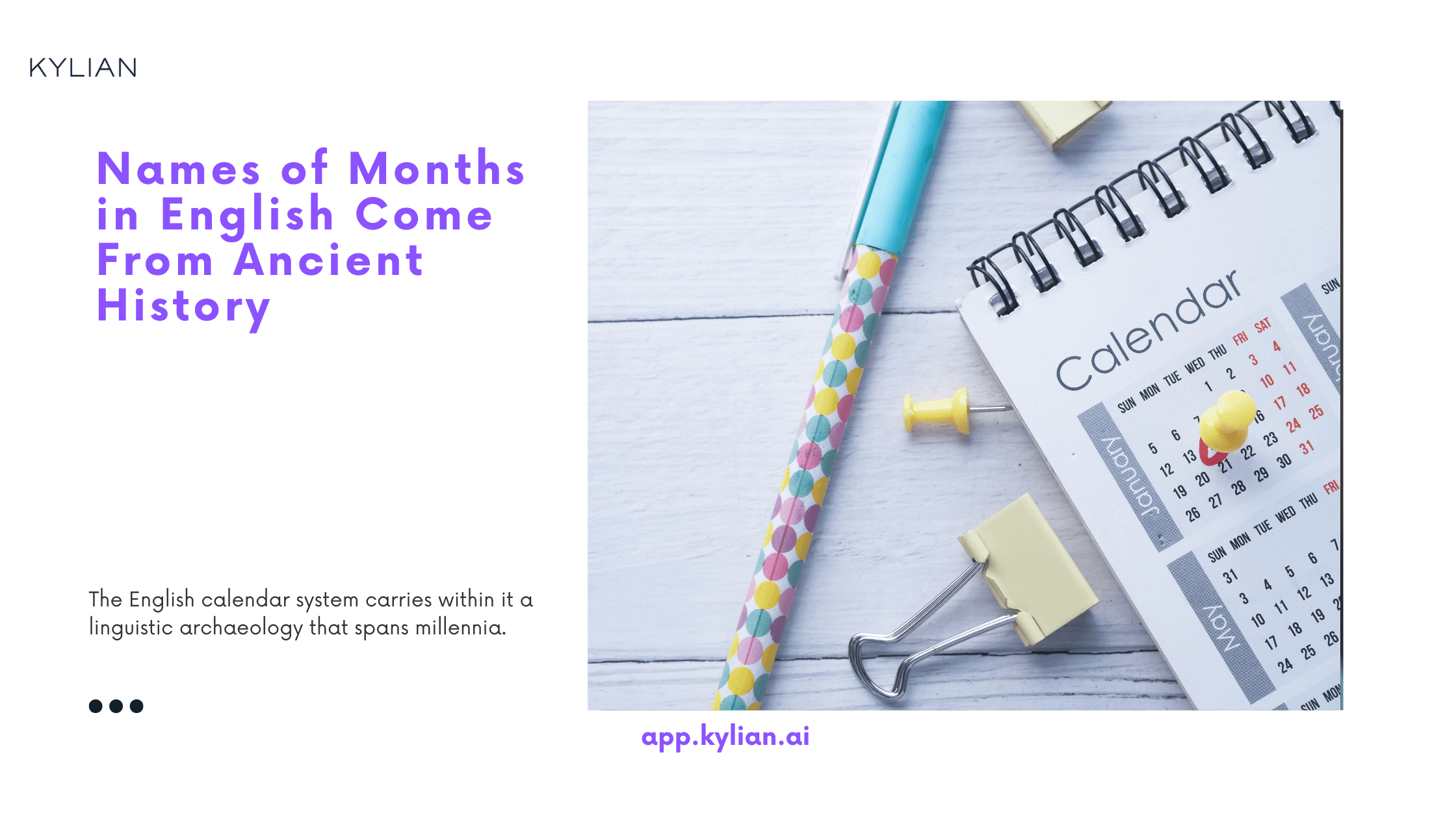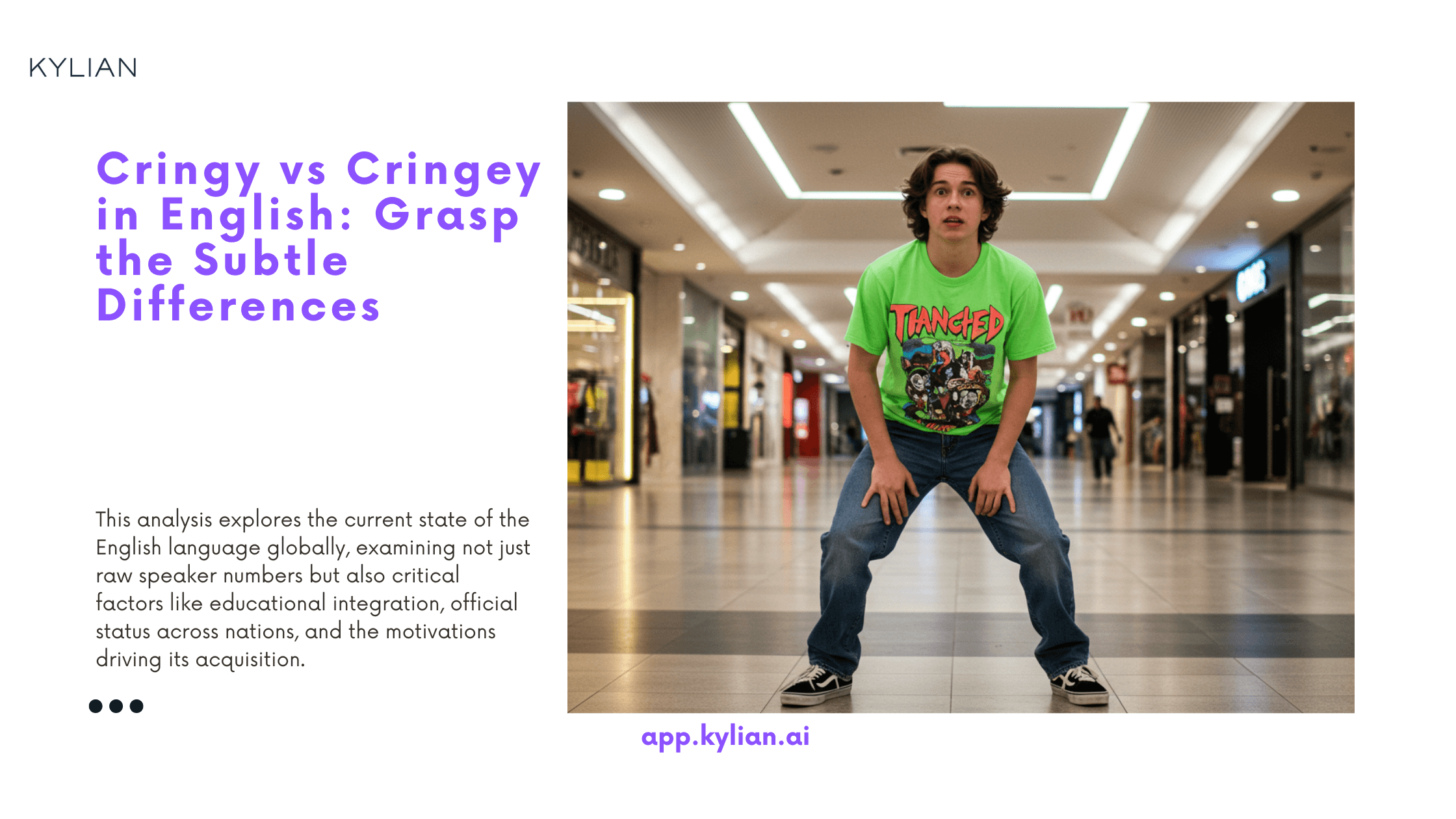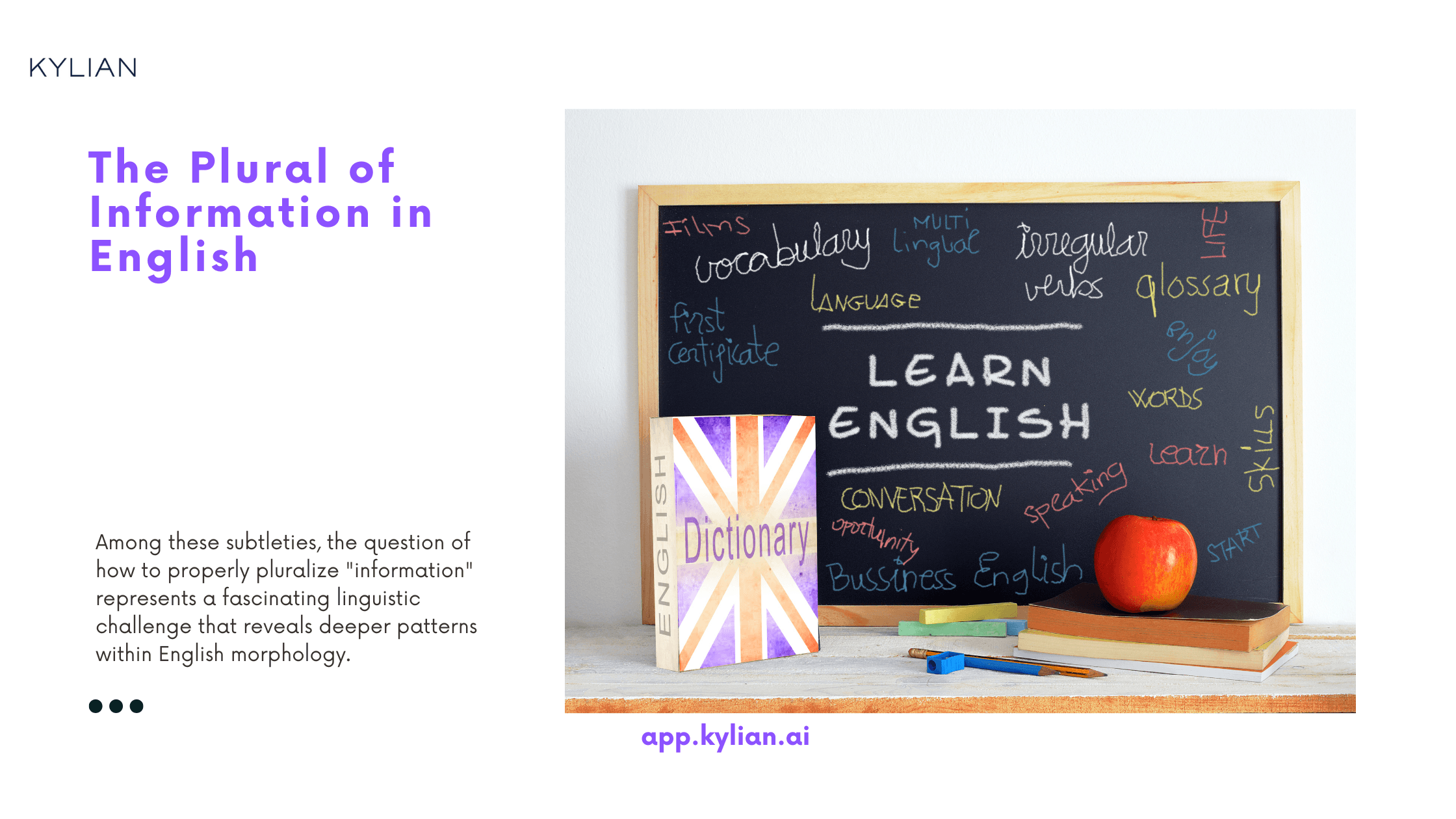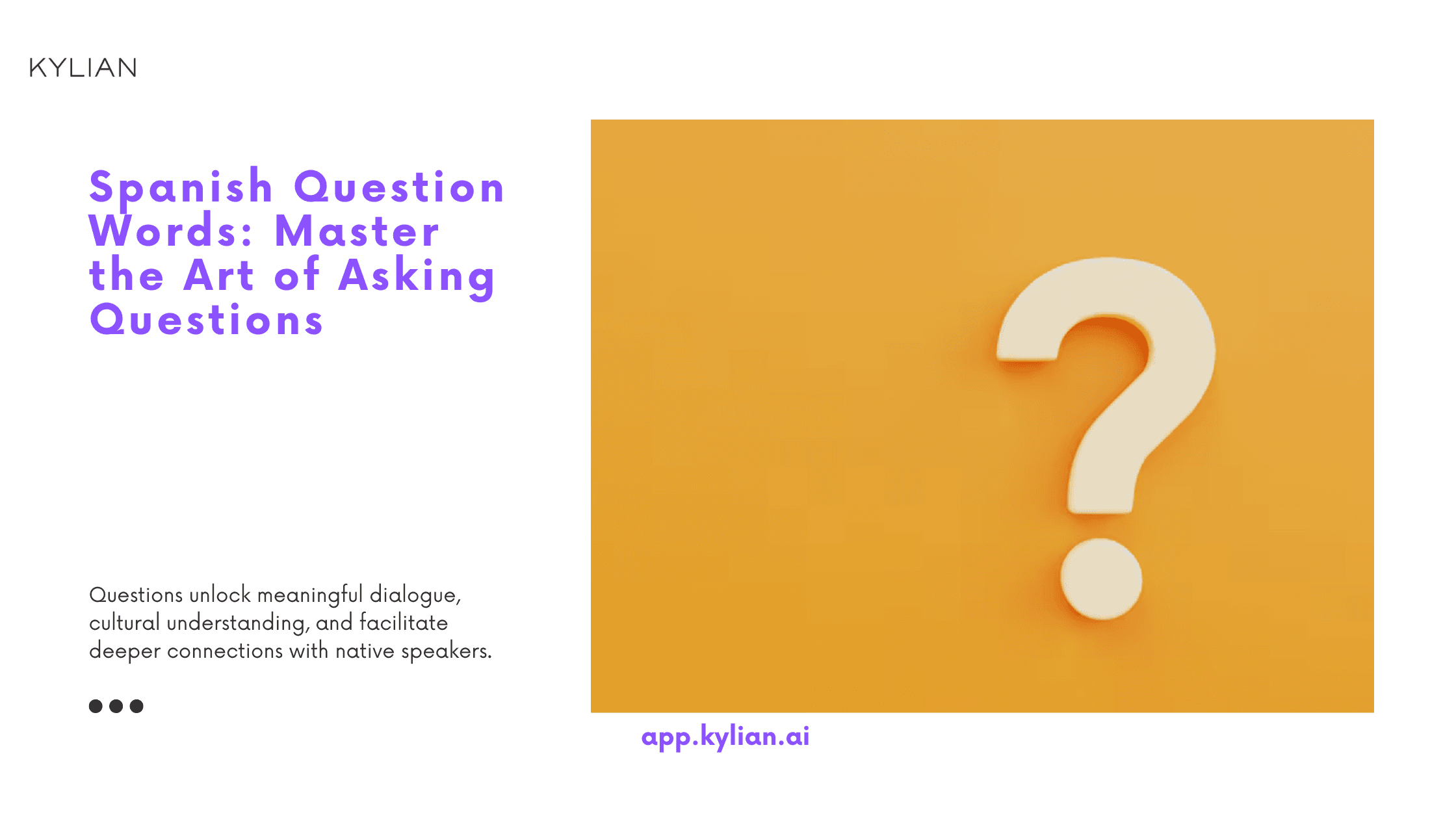

Names of Months in English Come From Ancient History
The English calendar system carries within it a linguistic archaeology that spans millennia. Every month name we casually use today represents a compressed history of Roman religious practices, imperial politics, and cultural evolution that fundamentally shaped how Western civilization conceptualizes time itself. This matters now because understanding etymological origins reveals how language preserves cultural memory. When we examine where month names originate, we uncover the intersection of mythology, politics, and astronomy that continues to influence modern temporal frameworks. The critical question becomes: how do these ancient naming conventions impact contemporary English usage and cultural understanding?


Master English Pronunciation with Tongue Twisters
Learning English pronunciation can feel overwhelming when you're trying to master sounds that don't exist in your native language. Traditional pronunciation drills often feel boring and disconnected from real communication. Tongue twisters offer a solution that's both effective and engaging—they force your mouth muscles to practice the precise movements needed for clear English pronunciation while keeping you motivated through their challenging, game-like nature. The real value of tongue twisters lies in their ability to target specific pronunciation problems that hold back English learners. These carefully constructed phrases expose exactly where your pronunciation breaks down and provide concentrated practice for the muscle memory needed for fluent speech. Understanding how to use them strategically can accelerate your pronunciation improvement dramatically.


Main Spanish Phrases to Know Before Visiting Barcelona
Barcelona demands more than tourist enthusiasm—it requires linguistic preparation. While Catalonia speaks Catalan as its primary language, Spanish remains the universal bridge for meaningful interactions. The city's tourism infrastructure operates predominantly in Spanish, making basic fluency not just helpful but essential for authentic experiences. The mathematics of language necessity become clear when examining Barcelona's demographic reality. According to the Instituto Nacional de Estadística, 99.9% of Barcelona residents speak Spanish, compared to 74.6% who speak Catalan. This linguistic landscape creates a clear strategic advantage for travelers who invest time in Spanish preparation rather than relying on English communication. Most critically, Barcelona's service industry—restaurants, transportation, local shops—operates with limited English proficiency among front-line workers. This reality transforms basic Spanish from a cultural courtesy into a practical necessity for accessing the city's authentic offerings beyond tourist-centric establishments.


What Should You Say When Someone Coughs? (English)
The moment someone coughs in a room, an invisible social script activates. What happens next reveals profound truths about cultural values, social hierarchies, and the unspoken rules that govern human interaction. This seemingly simple bodily function triggers responses that vary dramatically across cultures, contexts, and generations—responses that carry far more weight than their brevity might suggest. Understanding these cultural patterns matters now more than ever. Global communication has intensified, remote work has shifted our interaction dynamics, and health consciousness has reached unprecedented levels. The words we choose—or don't choose—when someone coughs can determine relationship outcomes, professional impressions, and social standing. This linguistic behavior operates as a cultural fingerprint, revealing assumptions about politeness, health, and social responsibility that define entire societies.


French Clothing Terms: From Casual to Couture Guide
French fashion vocabulary extends far beyond basic clothing names. Understanding these terms provides direct access to the language that shaped global fashion discourse, from haute couture runways to everyday street style conversations. This comprehensive exploration of French clothing terminology serves both language learners seeking practical vocabulary and fashion enthusiasts wanting to understand the linguistic foundations of style. The strategic importance of mastering French clothing vocabulary becomes evident when considering France's position in the global fashion industry. French fashion houses generate over €150 billion annually, making fashion France's second-largest export industry after aerospace. This economic influence translates into linguistic dominance, where French terms like "prêt-à-porter," "haute couture," and "avant-garde" have become universal fashion language.


15 Key English Time Idioms for Fluent Communication
Time governs every aspect of human existence, yet our relationship with it varies dramatically across cultures and languages. While Spanish speakers might say "el tiempo es oro" and Germans use "Zeit ist Geld," English speakers have developed a particularly rich collection of temporal expressions that reveal deeper cultural attitudes about urgency, patience, and opportunity. Understanding these time-related idioms isn't merely about vocabulary expansion—it's about grasping the cultural DNA that shapes how English speakers conceptualize temporal experiences. These expressions appear in boardrooms, casual conversations, literature, and media with such frequency that missing their meaning creates communication barriers that extend far beyond simple comprehension.


What is Colloquial Language? Comprehensive English Guide
Language exists on a spectrum. At one end lies formal, standardized communication—the kind you'd find in academic papers or legal documents. At the other end sits colloquial language: the raw, unfiltered way people actually communicate when they're not performing for an audience or following institutional guidelines. Understanding this distinction matters more than most language learners realize. Colloquial language isn't simply "incorrect" English—it's the authentic voice of native speakers in their natural habitat. When you master colloquial expressions, you don't just learn words; you gain access to cultural nuances, regional identities, and the genuine rhythm of how English actually flows in real conversations. Colloquial language represents the informal, spontaneous speech patterns that emerge in casual conversations. Unlike its formal counterpart, it embraces contractions, slang, regional dialects, and shortened expressions that reflect how people naturally communicate when they're relaxed and unguarded. This linguistic register captures the authentic voice of communities, varying significantly across geographical regions, social groups, and cultural contexts. The significance of colloquial language extends beyond mere vocabulary choices. It serves as a social marker, indicating group membership, regional identity, and cultural awareness. When someone uses colloquial expressions appropriately, they signal their understanding of social contexts and their ability to adapt their communication style to match their environment.


How to Say Hello in Japanese: 15 Authentic Expressions
Most language learners make a critical error when approaching Japanese: they assume konnichiwa is sufficient for every social interaction. This oversimplification undermines the sophisticated communication framework that Japanese society has refined over centuries. Understanding authentic Japanese greetings isn't merely about vocabulary expansion—it's about demonstrating cultural intelligence that opens doors to meaningful connections. Japanese greetings operate on multiple variables: temporal context, social hierarchy, relationship dynamics, and situational formality. Each greeting serves as a social signal that communicates your understanding of Japanese cultural nuances. When executed correctly, these expressions transcend language barriers and establish immediate rapport with native speakers. The economic and social implications are substantial. Japan remains the world's third-largest economy, and cultural competency in Japanese business interactions can determine professional success. More importantly, authentic greeting usage demonstrates respect for a culture that values precision, consideration, and social harmony above superficial pleasantries.


Cringy vs Cringey in English: Grasp the Subtle Differences
Language evolves constantly, propelled by cultural shifts and digital communication. Among the many terms that have gained prominence in recent years, "cringy" and "cringey" stand out as particularly interesting examples of linguistic evolution. These terms have become ubiquitous in online discourse, yet their distinctions remain elusive to many English speakers and learners alike. The phenomenon of "cringe" transcends mere vocabulary; it represents a complex social and emotional response that has been codified into language. Understanding the nuanced differences between "cringy" and "cringey" offers insight not just into contemporary English usage, but into the psychological dimensions of social discomfort and how we articulate these experiences. This analysis examines the etymological origins, usage patterns, and contextual applications of both terms, while offering clarity on their correct usage across different English variants. For anyone navigating modern English communication, particularly in digital spaces, mastering these subtle distinctions proves invaluable.


The Plural of Information in English
Understanding grammatical nuances fundamentally shapes how we communicate precision and intent in English. Among these subtleties, the question of how to properly pluralize "information" represents a fascinating linguistic challenge that reveals deeper patterns within English morphology. This examination matters because clarity in language directly impacts knowledge transfer—whether in academic writing, professional communication, or everyday conversation. The way we handle uncountable nouns like "information" demonstrates not just grammatical competence but conceptual understanding of how English categorizes abstract concepts. By addressing this specific grammatical point, we gain insight into the broader linguistic frameworks that govern how ideas are expressed across contexts and disciplines.


Automobile Types and Key Car Terms in English
The automotive landscape has transformed dramatically over the past decade, with electric vehicles gaining significant traction and autonomous driving technology evolving rapidly. Understanding the specialized vocabulary surrounding automobiles not only enhances communication for enthusiasts but provides practical utility for everyday situations—from maintenance conversations with mechanics to vehicle purchase decisions. Electric vehicles now represent over 14% of new car sales globally, a figure that has tripled since 2020. This shift demands a corresponding evolution in our automotive vocabulary. Whether you're discussing regenerative braking systems or comparing drivetrain configurations, the right terminology elevates both comprehension and conversation quality. This comprehensive guide explores essential English vocabulary for automobiles—covering vehicle classifications, car components, driving-related verbs, and practical terminology for various automotive situations. Beyond mere definitions, we'll examine how these terms interconnect within the broader automotive ecosystem and their practical applications in daily life.


Spanish Question Words: Master the Art of Asking Questions
Learning to formulate questions effectively represents a critical milestone in Spanish language acquisition. Questions unlock meaningful dialogue, cultural understanding, and facilitate deeper connections with native speakers. Rather than passively absorbing information, question formation empowers language learners to actively engage, seek clarification, and navigate everyday conversations with confidence.


Wedding Words and Phrases in English: Must-Know Expressions
Wedding ceremonies represent significant cultural milestones, carrying with them distinct vocabularies that reflect traditions, emotions, and social practices. Understanding these expressions isn't merely academic—it's practical knowledge for anyone attending, participating in, or planning a wedding in an English-speaking context. As language evolves alongside cultural practices, wedding terminology reflects both traditional values and contemporary approaches to matrimony. For non-native English speakers navigating these events, mastering these expressions becomes essential for full participation in these meaningful celebrations.


America’s Most Courteous States
The way we interact with each other leaves lasting impressions, whether in our hometown or while traveling. Small gestures—holding a door open, saying "please" and "thank you," or giving up a seat on public transportation—speak volumes about personal character and community values. These courteous actions, though sometimes overlooked in our fast-paced society, remain fundamental indicators of how we value respect for others. Even more telling, the collective behavior of a community can significantly shape visitors' perceptions of an entire region. Our comprehensive nationwide survey reveals which states are home to America's most courteous citizens. By examining various aspects of politeness—from verbal communication to everyday actions—we've uncovered fascinating patterns in civility across the country.


The Most and Least Desired American States for Vacation
As summer approaches, Americans nationwide contemplate their vacation plans, weighing factors from cost and climate to attractions and amenities. Vacation preferences reveal fascinating insights into American travel culture and priorities. Whether seeking coastal relaxation, urban exploration, or mountain adventures, travelers' destination choices reflect personal values and generational differences. Our analysis reveals clear patterns in state preferences, with certain destinations consistently ranking among the most coveted, while others remain overlooked despite their unique offerings. Understanding these preferences illuminates broader trends in American travel behavior and highlights opportunities for both travelers and destinations.


Learn English with 30 Inspiring Quotes (2025)
Motivation remains the cornerstone of language acquisition success. When embarking on your English learning journey this year, having the right mindset often determines whether you'll persist through challenges or abandon your efforts entirely. According to research from leading language learning platforms, the primary reason learners fail to achieve fluency isn't lack of resources or ability—it's simply giving up. This pattern repeats across demographic groups regardless of age, background, or initial proficiency level. The language acquisition process inherently involves frustration. You'll encounter moments when textbooks seem overwhelming, application notifications become irritating, and you find yourself thinking, "If only I'd started earlier in life, this would be simpler." The cognitive science is clear: while children do possess certain neuroplasticity advantages, adults bring powerful analytical skills and learning strategies that can significantly accelerate progress when properly leveraged. Rather than lamenting biological timing, successful language learners establish concrete objectives, develop structured plans, and commit to consistent daily improvement. Each incremental advance compounds over time, creating transformative progress. If you're seeking renewed motivation for your English learning goals in 2025, I've compiled wisdom from history's most insightful thinkers to reignite your commitment. But first, let's examine the fundamental question: why continue investing in English proficiency?


Popular Photography Slang Terms: Photography Jargon
Photography serves as a universal language, transcending cultural and linguistic barriers. Yet, within this visual medium exists a rich vocabulary of slang and terminology that photographers exchange among themselves. Understanding these terms not only helps you communicate effectively with other photography enthusiasts but also immerses you deeper into the culture of image-making.


How to Master Russian Sentence Structure: The complete Guide
Ready to embrace the challenge of learning Russian? Understanding Russian sentence structure is your essential first step. This comprehensive guide will help you navigate the complexities of Russian syntax and start building sentences with confidence. Learning Russian offers rich rewards despite its challenges. With its distinctive grammatical features and flexible word order, Russian sentence structure often presents the first significant hurdle for new learners. Throughout this guide, we'll examine the fundamentals of Russian sentence construction, explore how word order shifts can transform meaning, and analyze common structural patterns. By the time you finish reading, you'll have developed a solid foundation in Russian sentence construction and gained the confidence to form your own sentences effectively. Let's begin this linguistic journey together.


Climbing Vocabulary in English: Learn Key Terms For Climbers
Climbing transcends mere physical activity—it requires precise communication and technical knowledge that separates beginners from experienced climbers. Whether navigating vertical challenges at an indoor gym or planning multi-pitch routes on natural rock, your command of climbing terminology directly impacts your progression, safety, and integration into the climbing community. This comprehensive guide unpacks the essential vocabulary across different climbing disciplines, equipping you with the linguistic tools to communicate effectively with fellow climbers, understand route descriptions, and navigate gear specifications with confidence.


10 Easy Ways to Practice Real French Conversations
Polyglots consistently recommend immediate speaking practice when learning French for one compelling reason: it works. Conversation practice stands as perhaps the most effective method to achieve functional fluency in French. While initially intimidating, regular verbal practice builds confidence and competence simultaneously, developing both vocabulary and essential communication skills. The challenge for many learners lies not in understanding this principle but in finding practical ways to implement it. Speaking French regularly requires intentionality, particularly for those without immediate access to French-speaking communities. This article explores ten actionable strategies to integrate authentic French conversation practice into your language learning journey.


Figurative Language: What It Means and How to Use It
Communication transcends mere information exchange. When we leverage figurative language effectively, our words transform from functional vehicles into powerful instruments of persuasion and connection. Research published in the Journal of Cognitive Neuroscience demonstrates that metaphors—just one type of figurative language—significantly enhance emotional engagement in speech. This finding confirms what great communicators have always known: figurative language helps your ideas resonate, your arguments persuade, and your stories captivate. If you want your cover letters to stand out, your presentations to inspire action, and your everyday conversations to leave lasting impressions, mastering figurative language is essential. This guide explores the cognitive foundations, practical applications, and strategic implementation of figurative language to elevate your English communication skills.


How to Learn Turkish: The Beginner's Guide
Turkish stands as a fascinating language with rich cultural significance and growing global importance. Starting your Turkish learning journey might feel challenging, but with structured guidance and consistent practice, you'll progress steadily through each milestone. Whether your motivation is travel, cultural appreciation, or professional advancement, this comprehensive guide provides the foundation you need to begin speaking Turkish effectively.


What Is the HSK Test and How Can You Prepare for It?
Learning Chinese has emerged as a strategic advantage for professionals, academics, and cultural enthusiasts alike. At the center of demonstrating this proficiency stands the Hanyu Shuiping Kaoshi (HSK), China's standardized Chinese language proficiency test. Whether seeking academic advancement, professional opportunities in China, or personal growth, understanding the HSK's structure and requirements can significantly impact your language journey.


Effectively or Affectively: Which One Is Correct in English?
Words that sound similar but carry distinct meanings present some of the most challenging aspects of language mastery. The pair "effectively" and "affectively" represents a prime example of this linguistic challenge. These terms, despite their phonetic similarity, serve completely different functions in communication. The confusion between them stems not just from their similar pronunciation but from the subtle yet significant difference in the concepts they represent. Understanding when to use each term correctly requires more than memorization—it demands comprehension of their semantic roots and contextual applications.